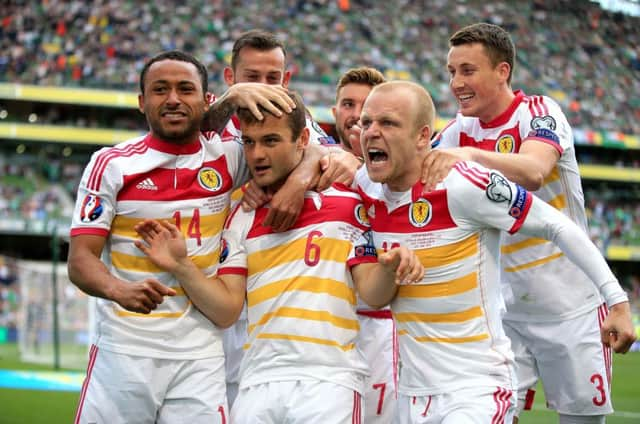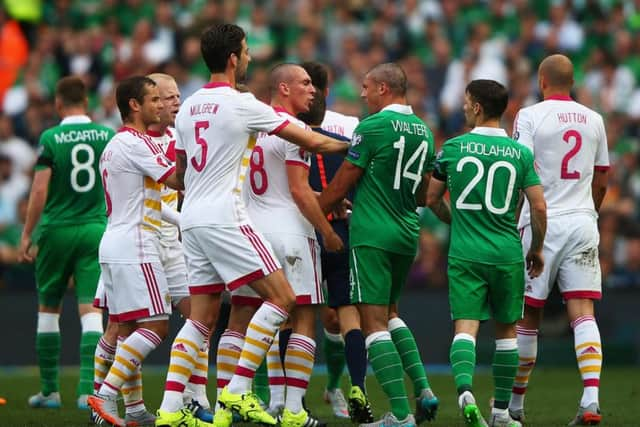Rep of Ireland 1 Scotland 1: Maloney to the rescue


Yet, the fact they emerged from Dublin with a point, earned by a fortunate equaliser by Euro 2016 talisman Shaun Maloney meant the outcome, if not the performance, would have been accepted by Strachan if offered beforehand.
Scotland remain two points ahead of the Irish in the Group D third place that would at least offer a play-off, although Poland have now built up a three-point gap.
Advertisement
Hide AdAdvertisement
Hide AdNot that it should be considered that John O’Shea deflecting a going-wide effort by Maloney at the start of the second period meant there was no luck for the Irish. Martin O’Neill’s men had that in sizeable helpings with a Jon Walters opener that should have been ruled offside and kept 11 players on the park after James McCarthy elbowed Russell Martin.


As it turned out, the occasion ended up offering more surprises before a ball had even been kicked than during an, at times, kick-and-rush confrontation. There was not a soul among the followers of either camp that predicted how their teams would line up. Yes, there were plenty of a Scottish disposition who speculated Charlie Mulgrew would be given a first start in seven months, and even that installed at centre-back, where he has played little in the international domain. Grant Hanley’s injury absence had him vying with Gordon Greer for such a role.
No-one read Strachan’s tea leaves, though, and concluded that Ikechi Anya would make way for Matt Ritchie. Or that Craig Forsyth would claim the left-back berth. Between them, Bournemouth’s Ritchie and Derby City’s Forsyth boasted 45 minutes of competitive football for Scotland. And Ritchie being hauled off at half-time in the skittish, but ultimately easy, win at home to Gibraltar accounted for that. The fact Ritchie failed to see the second period in the Aviva, and that his replacement Anya proved far more effective, made his initial inclusion questionable.
There was certainly an English Championship flavour to the proceedings across the two teams. The more uncharitable would extend that to the quality of the football likely to be produced in a British-style derby. Perhaps mindful of the hustle and bustle, or perhaps as an act of desperation, Republic of Ireland manager O’Neill produced a wild card by giving 32-year-old Daryl Murphy a first competitive start for his country. At Ipswich Town this season, Murphy has been a free-scoring forward with 31 goals. At international level, with no goals in 14 appearances, he has been more like the centre-forward of his fallow Celtic period.
O’Neill was deprived of Aiden McGeady because of a tight hamstring, and Robbie Keane did not feature after the double family bereavement he suffered this week on the back of seeing little action of late in the MSL because of fitness issues.
As a result of these absentees, the game-changers seemed in greater supply in the visitors’ ranks, where matchwinner from the November confrontation Shaun Maloney, Steven Naismith and Steven Fletcher appeared to offer encouraging potency. Following an up-and-at-’em opening so much the hallmark of O’Neill teams down the years, Fletcher served notice of his threat with a powerful, rising, effort from 22 yards that a fully extended Shay Given feathered over the bar.
It was natural to expect that the home side, both in terms of the location of the game and their location in Group D, would be the team forcing and taking the fight to their opponents. Alan Hutton and Forsyth were tested to the point of discomfort as Ireland sought to make capital down the flanks.
Yet, it was the more simplistic method of whipping balls into the box that allowed the Republic to draw first blood. With a cut that caused Scotland to curse. After a corner was won through Marshall blocking a Murphy header, the Scotland goalkeeper thwarting the same player from a Robbie Brady delivery allowed Jon Walters to knock the ball in from close range. However, as Murphy sent forward the header Marshall clawed out, the Stoke City striker was in an offside position.
Advertisement
Hide AdAdvertisement
Hide AdThe visitors would have nursed two grievances since on the half-hour mark Ireland should have been reduced to ten men when McCarthy led with an elbow in an aerial challenge with Martin to catch the defender full on the nose. The contact was clearly spotted by referee Nicola Rizzola, for he rushed to the scene while reaching for his pocket immediately. Inexplicably, though, it was the yellow he produced.
Even allowing for the indifference of their first-half efforts, Scotland deserved a break and they copped a major one when Maloney played a smart one-two with Anya then tried a speculative hit from the right-hand edge of the box that struck the back of O’Shea and spun in at Given’s right-hand post.
The equaliser imbued Scotland’s hitherto plodding efforts with a degree of propulsion but that was matched by the home side’s desire to force Scotland on to their heels. It was frantic, it was all-too-lacking in finesse and, even with the arrival of Keane for the closing stages, the encounter was free of anyone to provide a finishing touch. There is a reason why these teams remain third and fourth in Group D.
Republic of Ireland: Given; Coleman, O’Shea, Wilson, Brady; Hendrick, Whelan (McClean 67), McCarthy, Hoolahan (Keane 73), Walters; Murphy (Long 80). Subs not used: Forde, Westwood, Keogh, McGeady, Meyler, Christie, Ward, Quinn, McGoldrick.
Scotland: Marshall; Hutton, Martin, Mulgrew, Forsyth; Brown (McArthur 85), Morrison, Ritchie (Anya 46), Maloney, Naismith (Berra 90+1); S Fletcher. Subs not used: Gordon, Samson, Whittaker, D Fletcher, Adam, Greer, Robertson, Forrest, Griffiths.
Referee: Nicola Rizzoli (Italy). Attendance: 50,000